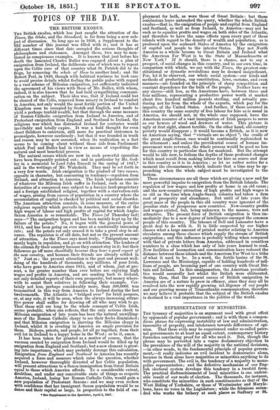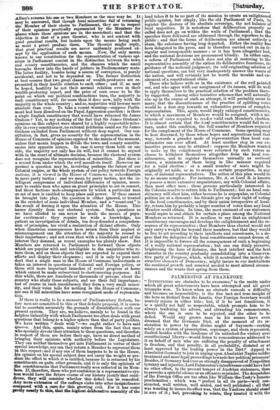REPRESENTATION OF MINORITIES.
Tire tyranny of majorities is an argument used with great effect by opponents of popular government; and is with them a compen- dious phrase for expressing instability of law and administration, insecurity of property, and intolerance towards differences of opi- nion. That these evils may be experienced under so-called pater- nal governments to at least an equal extent, contemporary history furnishes convincing proof for all who need it. But, though the phrase may be perverted into a vague declamatory objection to the prevalence of the will of the majority in the national decisions, —in other words, to the fundamental principle of popular govern- ment,—it really indicates an evil incident to democracies alone, because in them alone have majorities or minorities anything to do with government. The evil is, the tendency of a majority to mono- polize representation; and the defective mechanism of our Eng- lish electoral system develops this tendency in a twofold form. The practical disfranchisement of local minorities is one undeni- able result of our mode of election. The thousands, for instance, who constitute the minorities in such constituencies as that of the West Riding of Yorkshire, or those of Westminster and Maryle- bone, have no voice in the Legislature • while the felonious Boom- drel who works the bribery at such places as Sudbury or St.
Alban's returns his one or two Members as the case may be. It may be answered, that though local minorities fail of returning the Member of their choice to Parliament, they are in respect of their opinions practically represented by the Members for places where those opinions are m the ascendant; and that the objection is that of a pare theorist, who is not content with good practical results, but insists -upon the means being such as must a priori produce them. The theorist might reply, 'that good practical results are never uniformly produced ex- oept by the application of such means. Now, the only means known to our constitution for the representation of various opi- nions in Parliament consist in the distinction between the town and county constituencies, and the chances which the small boroughs throw into the hands of jobbers in Parliamentary seats. The latter facility, besides being a source of corruption, is purely accidental, and not to be depended on. The former distinction at best secures that two great chasm of wealth-producers are re- presented in their hostile relation to each other ; and if, as may be hoped, hostility be not their normal relation even in their wealth-producing aspect, and the price of corn cease to be the point on which our political combinations turn, the majority in each constituency wilL far more than it does now, tally with the majority in the whole country ; and so, majorities will become more absolute than ever. To take a recent warning—suppose Parlia- ment had been dissolved on the Papal Aggression question: is there a single English constituency that would have returned Sir James -Graham ? Yet, to say nothing of the fact that Sir James Graham's opinions on this subject were shared by a highly respectable mino- rity in every constituency, no rational politician could see Sir James Chatham excluded from Parliament without deep regret. Our con- stitution, in fact, gives no security for the representation in the House of Commons of opinions opposed to the mania of the moment, unless that mania happen to divide the town and county constitu- encies into opposite arrays. In case it array them both on one aide, the majority not only has its will, but it cannot be argued with in the court of ultimate decision, because the electoral system does not recognize the representation of minorities. But there is a second form under which the evil manifests itself. However im- portant a question may be, involving perhaps the future of our Colonial empire, or the whole system of our policy towards Foreign nations, it is viewed in the House of Commons in subordination to mere party tactics : and we mean by party tactics, not the in- telligent compromise of individual differences of opinion, neces- sary to enable men who agree on great principles to aot in concert, but those factious mob-arrangements by which a particular man or set of men is enabled to keep place and power. If these cannot be brought into play, the question is either ignored, or treated as the crotchet of some individual Member, and a "count-out" is the result of forcing it upon the attention of the House. This issues directly from our electoral system. Such questions as we have alluded to aim never be made the means of popu- lar excitement : they require too wide a knowledge, too patient an investigation of details, too deep-founded a comprehen- sion of principles, too vivid a realization of distant effects. Only when disastrous consequences have arisen from their neglect or mismanagement can the attention of the majority be roused to their importance ; and not even then with a hundredth part of the interest they demand, as recent examples too plainly show. But Members are returned to Parliament to forward those objects which are popular with and intelligible to the majorities who re- turn them, and on these objects they are expected to expend their efforts and display their eloquence ; and it is only by pure acci- dent that a single man in the House of Commons understands or takes an interest in questions of Colonial and Foreign policy, or those still more important branches of social progress at home
which cannot be e subservient to electioneering purposes. All this while, there are hundreds or thousands of persons about the country who study these subjects, and see their full importance ; but of course in each constituency they form a very small minor- ity, and their voice tells for nothing in the House of Commons ; nor can it till minorities have some recognized mode of representa- tion.
If there is really to be a measure of Parliamentary Reform, be- fore men are committed to this or that definite proposal, it is essen- tial to ascertain accurately the grounds of dissatisfaction with our present system. They are, weibelieve, mainly to be found in the -,helpless imbecility with which Parliament too often deals with great questions that belong to 'a higher sphere than that of party politics. We have written " deals with "—we ought rather to have said ignores. And this, again, mainly arises from the fact that men who specially devote their attention to these questions, and therefore in respect of them are before their age, have no direct method of bringing their opinions with authority before the Legislature. They can neither themselves get into Parliament in virtue of their special knowledge, nor can they return a Member to represent them in this respect; and if any one of them happens to be in the House, Ins opinion on his special subject does not carry the weight or pro- duoe the effect to which it is entitled, because he is returned by his constituents on quite other grounds, and it is only the opinions of the constituencies that Parliament really sees reflected in its Mem- bers. If, therefore, those who put confidence in a representative sys- tem would have the future course of our history justify that confi- dence, they will consider whether this defect can be remedied. Any mere extension of the suffrage sinks into utter insignificance - compared with a cure for this growing evil. For it has come .pretty nearly to thie, that the highest deliberative assembly of the
land takes it to be no part of its mission to create an enlightened public opinion, but simply, like the old Parliament 'of Paris, to register the decrees of its absolute sovereign, the net balance of local majorities. It is notorious that deliberation properly so called does not go on within the walls of Parliament ; that the speeches there delivered are addressed through the reporters to the public and that the forms of deliberation are almost entirely a sham, the substance having long departed. Either the reality has been delegated to the press, and is therefore carried out in en ir- regular and irresponsible manner ; or it has been altogether lost, and the national decisions are pronounced blindly. In either case, a reform of Parliament which does not aim at restoring to the representative assembly of the nation its deliberative functions, its guidance of the national judgment, its self-originating solution of national questions, can but very inadequately answer the wants of the nation, and will certainly not be worth the trouble and ex- citement of a constitutional crisis.
Those who believe with us in the existence of the evil pointed out, and who agree with our assignment of its causes, will do well to apply themselves to the practical solution of the problem there- by suggested. Among other tentative schemes that will naturally rise up in the course of such an attempt, it will probably occur to many, that the discontinuance of the practice of ,splitting votes would be a first step towards an exhaustive process of complete representation. This, again, would imply enlarged constituencies, to which a maximum of Members would be assigned, with a mi- nimum of votes required to render valid each Member's election. It is almost certain that the local constituencies would fail to re- turn, under this condition, the full number of Members required for the complement of the House of Commons. Some opening may be here discerned, by those whose hopes and aspirations tend that way, towards a grander mode of representation than local con- stituencies can ever afford. At least another step in our ex- haustive process may be attained : suppose the Members wanted to make up the complement were returned by such voters as choose to withdraw themselves altogether from the local Con- stituencies, and to register themselves annually as national voters, a minimum of them being in like manner required for a valid election : or a small number of seats might be originally set aside, so as to secure a certain proportion, in any ease, of national representatives. The action of this plan would be by no means complex. For instance, Mr. A. or Lord B. is known to possess a more extensive acquaintance, say with Colonial affairs, than most other men : those persons particularly interested in the Colonies resolve to return him to Parliament; but no local con- stituency will elect him, either because he is unpopular, or Colonial politics are at a discount: his friends give up their right of voting in the local constituencies, and by their union irrespective of local- ity, return him by probably a larger number of votes than any local Member could obtain. In time, the most eminent of our statesmen would aspire to and obtain for certain a place among the National Members so returned. It is needless to say that an enlightened constituency encourages and develops the enlightenment and the re- sources of its representative ; that Members thus elected would not only carry a weight far beyond their numbers, but that they would be free to act according to their intellects and consciences, to a de- gree that the delegates of the local constituencies cannot dream of. It is impossible to foresee all the consequences of such a beginning of a really national representation ; but one can dimly perceive, brightening the haze of distance, the best intellect and the best character in the country gradually consolidating into a Conserva- tive party of Progress, which, while it neutralized the merely de- structive elements of Democracy, might insure to our institutions the continual growth and renewal needed to meet altered circum-
stances and the wants that spring from them. •



























 Previous page
Previous page